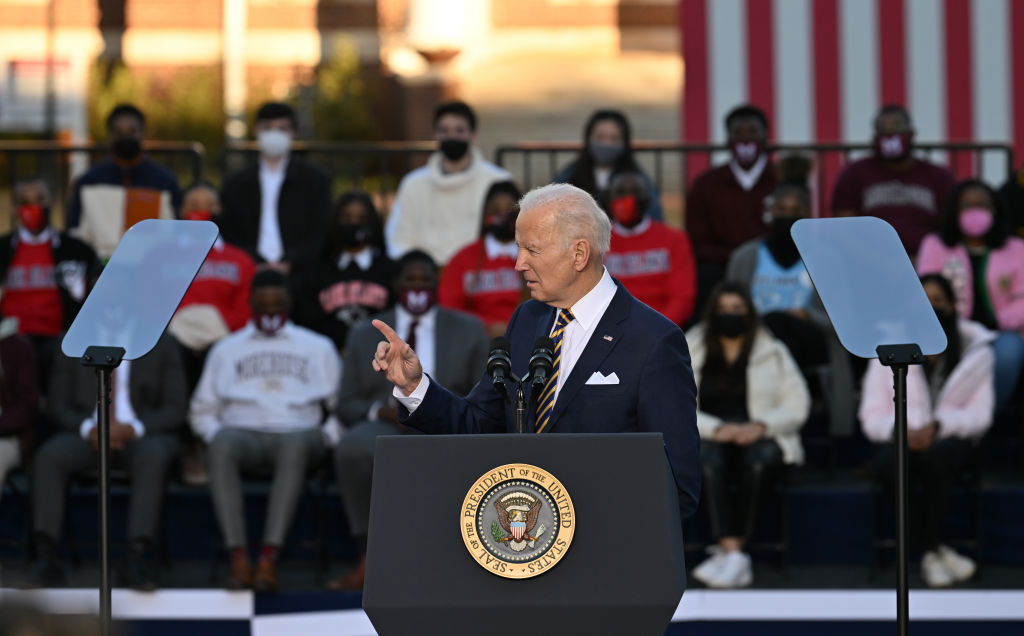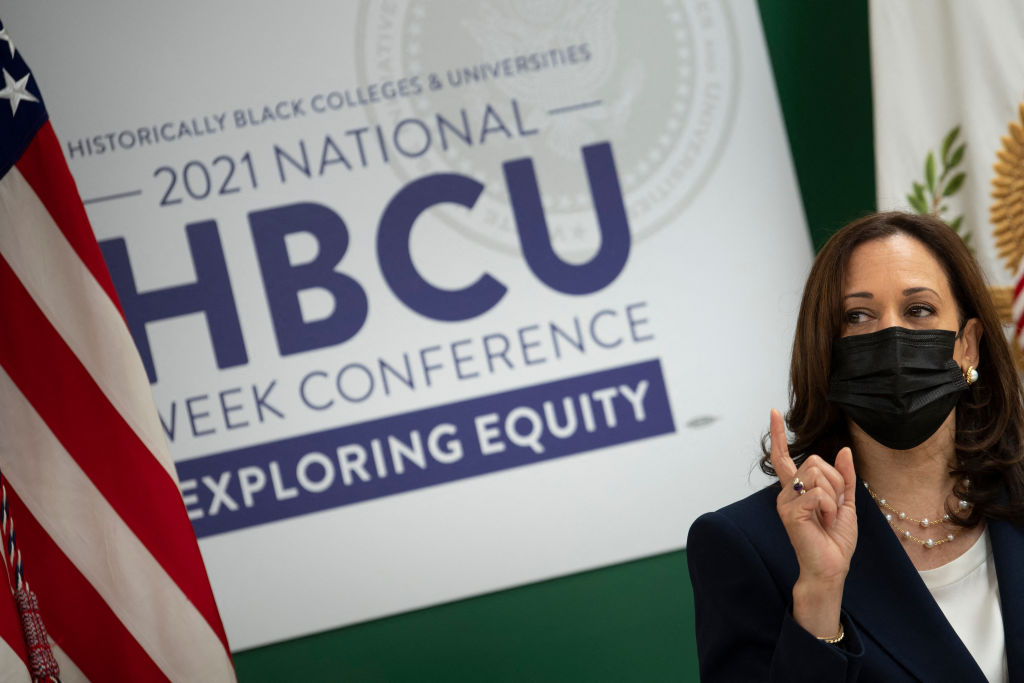
President Joe Biden and Vice President Kamala Harris speak to the American people about constitutional voting rights in Atlanta on the campus of Clark Atlanta University on January 11, 2022. | Source: Anadolu Agency / Getty
The conversation around HBCU funding from the current administration has reached another boiling point on social media.
There has been mounting criticism surrounding an NBC News report, which was subsequently covered by The Root, about how HBCU students feel regarding the Biden Administration’s promises of tens of billions of dollars in funding for historically Black colleges and universities.
The end result has seemingly been a ton of confusion about what exactly the Biden administration has done for these historic institutions in his first year in office. For those who aren’t aware of the day-to-day proceedings that go down in Washington, it can be a little hard to keep up.
Here are the facts.
In the spring of last year, President Joe Biden and Vice President Kamala Harris proposed $45 billion in funding for minority-serving institutions as a part of Biden’s Build Back Better agenda.
But as the Build Back Better legislation was negotiated between members of Congress, the amount of money for minority-serving institutions was scaled back to just $2 billion. However, HBCU advocates and institution leaders lobbied for the funding to increase to $10 billion. The House of Representatives passed the bill in November, but it has since stalled in the Senate as right-leaning Democrats’ opposition has prevented the legislation from advancing.
To be sure, passing the bill and having it signed into law would continue to add to the historic levels of federal HBCU financial support that we’ve seen from this administration. In the first year of Biden’s presidency, the administration has already given out $5.8 billion in support to HBCUs. Nearly $4 billion of that has come from the American Rescue Plan to provide COVID-19-related relief for these institutions. The Department of Education also discharged about $1.6 billion in debt from loans that these institutions had through the federal agency’s Capital Financing Program. Additionally, in the summer of 2021, the Department of Education gave HBCUs $500 million for fiscal stability and academic capacity building.
While those numbers are a far cry from the figure originally proposed, the nearly $6 billion are far from chump change. There will be more where that came from, too, the White House pledged.
“The President committed to historic investments and support for HBCUs and he is honoring that commitment. Since January, the Biden-Harris Administration delivered an unprecedented $5.8 billion in HBCU funding,” said Cedric Richmond, the Senior Advisor to the President and director of White Office of Public Engagement. ”This is only the beginning. We will continue to partner with academic leaders and stakeholders to uplift these engines of opportunity for generations to come.”
HBCU leaders have expressed gratitude to the Biden Administration for the funding that has been crucial to so many Black colleges. But some elected officials and industry experts have taken a more cautiously optimistic approach to the situation that they say is dire without the adequate — and promised — amount of funding.
North Carolina representative Alma Adams, a graduate of North Carolina A&T University who leads the bipartisan HBCU caucus, spoke to the New York Times in October and emphasized the importance of investing in these institutions.
“If we’re going to invest truly in our nation’s infrastructure, we have to invest in the places that lift up those who are most underserved, and that’s H.B.C.U.s,” Adams told the New York Times. “It’s the same thing as when we’re talking about crumbling roads and buildings; we’ve got crumbling on these campuses as well.”
Lodriguez V. Murray, the United Negro College Fund’s senior vice president for public policy and government affairs, warned of consequences if government-set expectations are not met.
“We’ve done more with less forever, and promises made just have to be promises kept,” Murray told the Times. “The president did his part, and now if Congress doesn’t act, it won’t just be heartbreaking, but it will continue to demoralize our community.”

Vice President Kamala Harris speaks during a discussion with students as she tours Hampton University during a visit highlighting Historically black colleges and universities (HBCU) and science, technology, engineering, and mathematics (STEM) programs on September 10, 2021, in Hampton, Virginia. | Source: BRENDAN SMIALOWSKI / Getty
In November, more than 50 HBCU presidents signed a letter appealing to Senators to pass Build Back Better.
“It is a significant down payment on investment in an American future full of talented citizens who are not inhibited by where they come from or what they look like,” the letter read in part. “You have the opportunity to help secure that future.”
Clark Atlanta University President George T. French, who signed that letter, said in a separate statement written by the National Association for Equal Opportunity in Higher Education that the government’s financial support for HBCUs over the past year cannot be understated.
“The impact of the funds on HBCU campuses, and as a catalyzer of other public and private investments in HBCUs is substantial. Universities across the Nation such as Clark Atlanta University, have benefited tremendously during the first year of the Biden-Harris Administration as the result of the stewardship and advocacy of the Biden-Harris administration for the unprecedented $5.8 billion cumulative investment in and support for HBCUs through the American Rescue Plan, debt relief, and grant funding for academic capacity building and fiscal stability,” French said. “This year was a banner year for HBCUs, in large measure because of the leadership of the Biden-Harris Administration.”
Despite HBCU leaders seeing the impact of the financial commitments already made by the administration, students have still been skeptical. Consistency will prove to be key for the Biden Administration if they want to please a huge part of their younger voting demographics.
“This was a good beginning,” said French. “The HBCU Community is going to continue educating the administration, policy makers, policy shapers, and financial, academic, research, and community partners, that HBCUs really are the best return on investments to move America to realizing her Egalitarian Ideal.”
SEE ALSO:
Promised Billions In Funding, HBCUs Get Short End Of The Stick In New Budget Proposal
What’s The Truth About Biden’s Commitment To HBCU Funding? was originally published on newsone.com
















